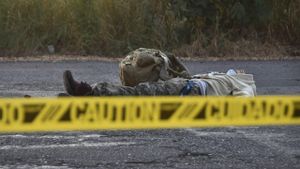Severe winter weather conditions have triggered widespread school closures across Khanty-Mansi Autonomous Okrug, with temperatures plunging to as low as -39 degrees Celsius. Parents and students alike have voiced their concerns over the adequacy of safety protocols, prompting local authorities to reassess measures to protect students from harsh weather.
On January 23, significant snowfall accompanied by bone-chilling winds forced the cancellation of classes for grades 1-4 across several towns, including Hanty-Mansiysk, Kogalym, and Nefteyugansk. The freezing temperatures led to the decision to declare "actirical days"—when students are relieved from attending school due to adverse weather conditions. The mayor of Surgut, Maxim Slepow, suggested evaluations could change, where decisions would factor not just on thermometer readings but on perceived temperatures and wind chill affecting children's safety.
Students have taken to social media to express their frustrations. One student from Nefteyugansk reported, "Today was -25 outside, and I study at a gymnasium quite far from home. We had to walk through blizzards to get to class." Many others echoed similar sentiments, highlighting the discomfort and risk associated with such harsh conditions.
Reports from various regions indicated differing responses from school administrations. While many municipalities granted breaks for younger students, some areas pushed forward with classes for older grades. For example, complaints poured in from Yamal-Nenets Autonomous Okrug and Chelyabinsk, where students also experienced unsafe travel conditions but were still required to attend school. An agitated student articulated, "Why are we being forced to go to school when it feels like -40 outside? The weather is hazardous, and yet classes proceed as normal!"
Concerns about school safety protocols have propelled discussions onto public platforms, sparking dialogue between citizen groups and government officials. The head of the "League of Safe Internet" division, Ekaterina Mizulina, has been particularly involved, receiving numerous complaints via her Telegram channel from worried students about the neglect of their safety.
Mizulina observed, "Today, pupils from 1st to 8th grades are being sent to school amid winds of 13 m/s, with temperatures feeling close to -40 degrees. For the wellbeing of the children, these protocols clearly require reevaluation!"
On the ground, school district administrators are beginning to face pressure to adapt their approach to closures. The decision processes are shifting as weather forecasting technology improves, providing more insight than simplistic temperature readings. This would allow for dynamic response protocols based on real time feels-like temperatures, ensuring student safety is prioritized.
Weather forecasts from the Khanty-Mansi Autonomous Okrug's meteorological center have painted grim pictures for the coming days, with expectations for continued severe cold and potential snow accumulation. The area is witnessing some of the harshest conditions recorded this winter, with specific alerts remaining active for multiple regions. School officials hinted at possibly continuing closures if the conditions do not improve sufficiently.
On social media, people expressed their sentiments, wishing for appropriate solutions to prevent children from facing such terrible conditions unnecessarily. One resident commented on the situation saying, "Child safety is non-negotiable; learning must not come at the expense of risk."
Nonetheless, authorities are under intense scrutiny when it involves the apparent disparities seen across different cities. While many places have enacted closures, other municipalities remained hesitant—prompting protests from communities seeking change.
The Khanty-Mansi Autonomous Okrug has seen rising tensions as it appears the southern regions are more proactive compared to others. Some towns are calling for unified standards and practices to mitigate disparities and guarantee safety uniformly across the region.
Reflecting on community needs, local authorities are urged to revisit and bolster emergency protocols, assessing the possibilities of timely notifications for schools and families concerning severe weather. A shift to more responsive guidelines could play a significant role moving forward, as many locals are demanding transparency and more consistent safety measures for their children.
Adverse weather conditions triggered the cancellations and actitative responses around the Khanty-Mansi Autonomous Okrug, prompting both public outcry and administrative review of protocols meant to protect students. The future of school operations during winter remains uncertain as expectations for nasty weather conditions and continued scrutiny loom. Families await improved solutions ensuring student safety will remain prioritized regardless of the season's challenges.



